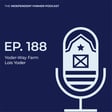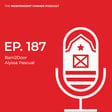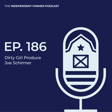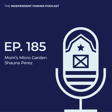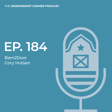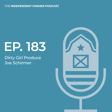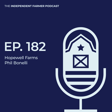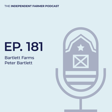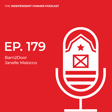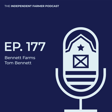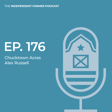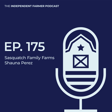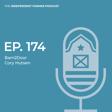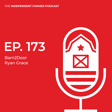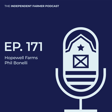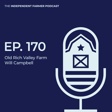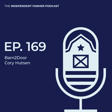Become a Creator today!Start creating today - Share your story with the world!
Start for free
00:00:00
00:00:01

How to Allocate your Farm Marketing Spend
In this week's episode, James meets with Taylor of Bridging the Gap Financial Services LLC to discuss how to allocate Farm finances across marketing efforts. Taylor explains what can be considered a write off and the importance of budgeting for marketing efforts.
For more Farm resources, visit: barn2door.com/resources
Transcript
Introduction to the Podcast and Hosts
00:00:10
Speaker
Hello and welcome to the Independent Farmer Podcast, the go-to podcast for do-it-yourself farmers who are taking control of their own business, skipping the middleman, and selling direct to local consumer and wholesale buyers. This podcast is hosted by Barn to Door, the number one business tool for independent farmers to manage their business, promote their brand, and sell online and in person. Let's dive in to today's Independent Farmer Podcast.
Focus on Marketing Budget Allocation
00:00:42
Speaker
Welcome to the Independent Farmer Podcast. I'm James, the CEO of Barnadore and your host for today's episode. As many of our listeners may be aware, Barnadore offers an all-in-one business solution for independent farmers who are seeking to cut out the middleman and take control of their business, selling direct under their own brand, where customers can purchase from them directly online and in person. In today's conversation, we're going to get into how to allocate your marketing budget.
00:01:07
Speaker
and why you need to have a marketing plan for your farm. Today, I'm happy to welcome back Taylor Bridges, a QuickBooks Pro Advisor and the owner of Bridging the Gap Financial Services. Taylor works with farms across the country, helping them manage their finances and maintain accurate reporting along with other bookkeeping and accounting services. Today, we're going to talk with Taylor about best practices when it comes to allocating money for your farm marketing and why it's important to put money towards marketing efforts to grow your business.
00:01:36
Speaker
Welcome back Taylor. It's great to see you. Yeah. Super excited to be back. Well, I hope you are having a wonderful holiday season with your family, but for our new listeners who may have not heard about you or listened to a prior podcast with you, maybe you can give a little bit of background on yourself and your accounting practice. Sure. My name's Taylor Bridges. My family and I live on a farm in the mountains of Virginia and a really rural town.
00:02:02
Speaker
ah We have horses, a dairy cow, beef cows, cattle dogs, and bees right now. I knew that when we had kids, when my husband and I got married that I would want to stay home. So I went back to school after we had kids and went through a bachelor's and master's degrees, both in accounting with the goal of eventually opening my own firm. That dream came true in 2021. I got to open my own firm and we just haven't looked back since. It's been a really awesome experience.
00:02:27
Speaker
Well, it's been wonderful Taylor to work with you and more importantly to see all the advice that you've been able to give to farmers, especially given that you really understand the business, being a farmer yourself, right? And just being in a rural community. Tell us a little bit about your accounting practice. How do you work with farms today? Sure. My firm primarily works with people in the ag industry and a few other small service businesses across the country. Growing up with a passion for ag and then pursuing accounting has really allowed me to combine my favorite things, makes work a joy for me.
00:02:55
Speaker
No two days ever look the same, but I find that having an ag background myself means I totally understand what my farmer clients are dealing with. And that's helped me a lot. My firm handles cleanups of prior books, regular monthly bookkeeping tasks, accounts receivable payable and custom reporting along with other things. I spent a lot of time combing over expenses and reports with my farmer clients and working on ways to make sure they're getting to be profitable across their different enterprises while trying to take off a lot of the stress from their shoulders in the books department.
00:03:23
Speaker
Speaking of which, Taylor, I recall we did a podcast last year talking a little bit about farm finances and what to do, your checklist for getting ready. So anyone who's listening to this, you browse back through our podcast list because Taylor gave a lot of great advice, you know, about getting ready and managing your books for the coming year. There's a really great checklist and on how to manage all those expenses because there's a lot of things. Today we're going to be diving in specifically to marketing expenses. So right.
Marketing as an Operating Expense
00:03:50
Speaker
So when it comes to advising your clients on marketing, Taylor, I know marketing is treated as a variable expense, right, for farmers and often perceived more of a stomachache or problem, right rather than something to invest in. So maybe we can talk a little bit about the realities of how marketing is treated from an accounting perspective. So how is marketing treated on the books?
00:04:13
Speaker
From an accounting perspective, we look at marketing as a super useful tool, both for the business that's trying to expand as well as for tax purposes. Marketing is typically going to be an operating expense on the books. And that means that it's going to be deducted from the business's taxable income, potentially saving the farmer money on the taxes that they owe at the end of the year. Wow, that's a really important thing that you just said. So I'd love for you to clarify that again. So marketing actually can be actually used as a set off against taxes that they would actually owe at the end of the year. How to how does that work?
00:04:40
Speaker
Yeah, so when the farmers are taxed, they're going to be looking at their income versus their expenses. And once they subtract those expenses out, since marketing can be considered an operating expense, that isn't counted towards taxable income.
00:04:54
Speaker
That's wonderful. So that means when farmers make these investments in marketing, it's actually going to reduce their taxable income, right? Reduce what they would owe. That's fantastic. So when thinking about a farm's kind of presence, because they oftentimes have a presence online and in person, right? Because, you know, we live in this age now where it's both in person and and obviously online.
00:05:16
Speaker
Let's talk about intangible expenses first, meaning like things that
Deductible Marketing Expenses
00:05:20
Speaker
are digital. What qualifies as a marketing expense in the online arena? Sure. There are a lot of things that can be written off, so to speak, when it comes to marketing. Like you said, it's a highly digital world now. As far as intangible marketing, we're going to be focusing on things like online advertising, so Google ads, social media ads, and radio or TV ads as well. Any software used to facilitate sales and marketing, like MailChimp, those are going to be marketing expenses.
00:05:45
Speaker
We're also going to look at expenses for purchases of digital assets, logos, or photos, like with Barnador Marketing Toolkit. Additionally, any online placement or referral fees would be included in this category. So for example, paying out for a redirect to a partner. I even include the money I spend for someone to draft social media posts for me, so I don't have to spend the time in brain cells on it, but these are all intangible marketing costs.
00:06:06
Speaker
Isn't that amazing? Right. It's a lot of times what you might expect to be a burden and something a farmer has to sit around the kitchen table at night trying to figure out, Hey, how do I do this? Or why should I, what should I draft for social media? ah Using something like you said, you know, a third party partner, in our case, a barn to door, we offer a marketing toolkit. That's actually a deductible expense for the farmer, right? You even deduct a social media writer for you, right? Is that correct? Yeah, definitely a worthwhile expense.
00:06:33
Speaker
oh That's awesome. what What about tangible expenses, though, in-person, right? Because all these farmers have real property, real assets. Depending on the farm and how they go to market, there's probably a lot of tangible expenses. What we'll call Pfizer is a marketing expense there. Yeah, so all those tangible marketing costs that you can get your hands on and are physical. We're talking about business cards, physical signage, as well as placards. The market booth you run out every Saturday morning, those count. The trailer the farmer uses to travel to market events and pop-ups, those count.
00:07:03
Speaker
Those kinds of items are all going to be tangible marketing costs that the farmers should be keeping receipts for and they could be writing off on their taxes. Even those costs that they're spending on marketing personnel could be a write off potentially.
00:07:14
Speaker
Well, I'm thinking of a trailer as a marketing expense. That's pretty awesome for a lander, which I bet to think about. But I know many of our farmers actually do this. They pull a trailer and maybe they park in a school or church parking lot or business. They have a QR code up on the side. So they built signage effectively. They're paying for signage on the side of the trailer. The whole trailer and the signage on the trailer, that can all be deducted as a marketing expense.
00:07:37
Speaker
Absolutely. Those truck wraps, any decals you get to put on your windows so someone, like you said, could snap your QR code or see your phone number, those all count. Yeah. ah That's awesome. I think a lot of farmers would be pleasantly surprised to learn that it's actually deductible, not just as a capital asset, but potentially as a marketing expense. That's awesome. At present, you know I know you work with a lot of farmers. How often do you see farmers actually setting aside a budget for marketing, or is it or is it more of an afterthought?
00:08:05
Speaker
Honestly, I think more farmers treat it as an afterthought than not. Unfortunately, when I check out a new farmer's business, it might include maybe a little bit of marketing budget here and there, but it's also one of the first budget categories they tend to rob from and apply towards other more tangible expenses for some reason.
00:08:20
Speaker
Well, I know that the core reason there, obviously, many farmers are just pretty frugal, right? They may not see value in marketing because, you know, maybe there's not ah a clear ah ROI for the expense, right? So why is it in your mind, why is it important to budget and actually honor the budget commitments that they're setting aside when thinking about marketing their farm business?
Importance of Marketing Budgeting
00:08:40
Speaker
A marketing budget is super important for farmers. Marketing is just part of doing business, especially true in today's digital world, where there's just so much information and so many options at our fingertips.
00:08:50
Speaker
your farm isn't having good branding and they can't be recognized and it's going to be commoditized. Most successful farms that are earning a premium for their products are the ones that have built a brand around themselves. That's something that takes money, doesn't just appear out of thin air, but by taking the time to specifically plan ahead for marketing costs, as well as the other parts of running a farm business, all those other budget categories, they're going to be giving themselves a much higher chance of success. So financial planning is a huge part of having a successful business. Without that solid foundation, you might as well have just built your house on sand. There's no way to uphold yourself if no one knows you even exist. So it's really in important to be putting money towards your marketing efforts. That's well said. I know talking with a lot of farmers many times may say, Hey, I have a stable basic customers. Why do I need to build a brand? Why do I need to market?
00:09:39
Speaker
not often remind folks like like, look, you know, one out of seven people move every year, right? So they just may move away, right? So you have to be spending on marketing or putting in marketing efforts just to even keep a stable base of existing customers, not necessarily even just growing your basic customers, right? So it does take planning and and and thinking ahead.
00:09:59
Speaker
When looking at small businesses, because you did mention you work with some other different types of businesses, not just farmers, what do you use see as a typical set aside for other small businesses? I mean, when I look online, most numbers range somewhere between like seven, eight, maybe 9%. What do you think you see typically today with farmers? Yeah, I'd say most farmers are typically budgeting a lot less than that number. Unfortunately, I'd actually venture to say many don't budget any money at all towards their marketing efforts. That happens frequently as well. It's a mistake.
00:10:28
Speaker
they really should be putting in the effort to market their farms in positive ways to their ideal targets. In today's brand-centric world, I really encourage farmers to be planning ahead for their marketing efforts. Yeah, I know certainly if they ever want to sell their farm, too. I know we work with a lot of farmers who built great businesses with Barnador and built a really strong base, built a great brand, strong base of subscription, recurring revenue, and have been really quite successful in selling that farm as well to another farmer, right?
00:10:56
Speaker
but it's oftentimes because you have a great brand and a great base of customers. right It's not just because they have products per se. so When thinking about investing in marketing as a farmer, how should they think about r ROI? right How do they think about the return on investment? How much money you know should they be spending and what should they expect in return for that money? For starters, if you're making $200,000 a year and you don't have a budget for marketing, you don't want to go and waste 20 grand on something unproven like Facebook ads. so just slinging money out into the universe in the name of marketing and hoping for the best is not a solid approach here. The goal is that the investments you make as far as marketing goes are going to make you more money than what you spend on those efforts. You don't want it to be wasted. There's of course going to be some upfront costs and investments as you build your brand and you equip yourself to be on the playing field, but you have to be smart about them. So basic branding, your online presence and your ability to market and capture your orders, for example, a point of sale, those are all going to be absolutely essential.
00:11:53
Speaker
Those are all marketing investments that are going to bring in revenue and can be easily measured so that you can be tracking the value of your business. From there, you start with grassroots marketing efforts. These are the free things like word of mouth, very popular in a lot of areas, and then slowly expanding into more paid channels, for example, targeted ads that are paid for or farmers markets, that kind of thing.
00:12:14
Speaker
That's really great feedback and great wisdom. When you think about measuring those returns, I know many times farmers might just look at a one-time purchase. Hey, like I went to a farmer's market. I got this customer. But I imagine, I know talking with many of our farms, they're often looking at it like,
00:12:31
Speaker
how often does that customer keep coming back? right How do I convert them into perhaps a subscription buyer of my milk or my produce box or my meat box? Because I've seen some of our farms take you know the spend on acquiring one customer at a farmer's market and turn it into a meat box subscription at 100 bucks a month. That's $1,200. That's a great return on investment. right and so you know it's It's really great to see, but if you're not measuring it, you don't really know if you can improve it, I would imagine.
00:13:00
Speaker
right Is there any other wisdom you have in terms of thinking about when it comes to marketing spend? Because I know, like you said, most of the farms you work with and many of the farms we talk to here at Barnadore, this is new to them, right? They may have previously sold through commodity markets, through an aggregator or distributor. What are some missteps to avoid when thinking about getting started with a marketing budget for their farm business?
Local Focus in Marketing Strategies
00:13:24
Speaker
I would advise against a shotgun approach where you're just slinging all your marketing efforts everywhere at once. You cross your fingers and you just hope something sticks. Marketing spend efforts, if at all possible, should definitely be more targeted and focused. Attention put on building a strong, loyal brand presence in communities that you guys serve directly is going to be a huge boost typically. Think on scale, you don't need to take out a Super Bowl ad to sell protein producer cheeses. right so I see the most success with those farmers that are placing their focus on their local relationships, whether that's at a neighborhood business, their churches, or even their schools. These are all focused placed in the right direction for solid growth for them, typically.
00:14:03
Speaker
And people who attend a local school, church, or frequent a local business, those are more likely to be people who are going to want to support another small local business, like a local farmer, right? I know to myself i know for myself, I go to a dentist that I found on the back of our church bulletin, right? I might, you know, attend and go to a CrossFit gym that I found out from another local business that might be near be maybe a health clinic or that type of thing. No different for accessing healthy local food, right? Why not again leverage the relationships in your local community to help again access those types of customers. Is there anything else you'd like to share or anything else you want to add to our conversation here before we wrap up you know when thinking about marketing? Because again, this is ah is a hot topic for a lot of farmers who are thinking about building a brand.
00:14:49
Speaker
Yeah, you're always going to have to spend money to make money. It's just a fact of life. And this is one of those things that's no different. You're going to have to spend a little bit of money here. Relying on 100% grassroots marketing strategy is going to take a lot of time and effort. The money spend would be totally worth it if you're targeting in the right directions. Remember, you should assume, like you said earlier, one out of every seven people move every year. You're going to expect a little bit of churn, and that's just how it's going to be. And so continuing to market yourself is going to cover some of that. It's not something you just pursue once like, Oh, I did an ad this week, two years ago, that's fine. And then you just get tired of it, let it go. So no matter what, you should definitely be continuing efforts in this category to maintain core business. And growing your business is going to take additional marketing investment from your farm, just something you should be planning for and definitely include that in your firm's budget.
00:15:40
Speaker
So talk with your accountant, talk about your budget for the coming year, like what you spent last year. And then like you said, be smart. Don't take a shotgun approach. Be very measured in where you put your money and then see if it pays a return, right? Really great advice. Great. Well, Hey, I want to extend my thanks to Taylor for joining us on this week's podcast episode. You can check out more of Taylor and her financial services on her website. at btg btgfinancialservices.com. That's btgfinancialservices.com. At Barner Door, we're humbled to support thousands of independent farmers all across the country and delighted to offer our services and tools to help farmers access more customers, increase sales, and save time. If you're an an independent farmer who wants to learn more, check out barnerdoor.com backslash learn more and to dig into other resources that may be available to you.
00:16:28
Speaker
Thank you for tuning in today and we look forward to joining you next time on the Independent Farmer podcast.
00:16:43
Speaker
Thank you for joining us on the Independent Farmer Podcast. At Barn to Door, we are passionate about empowering independent farmers to build a thriving business. To all the farmers out there, thank you for all you do to grow amazing food, care for the soil, and serve your local communities. You are the backbone of our country. For free farm resources or to listen to prior podcasts, go to barntodoor dot.com backslash resources. We hope you join us again and subscribe to the Independent Farmer Podcast wherever you stream your podcasts. Until next time.
